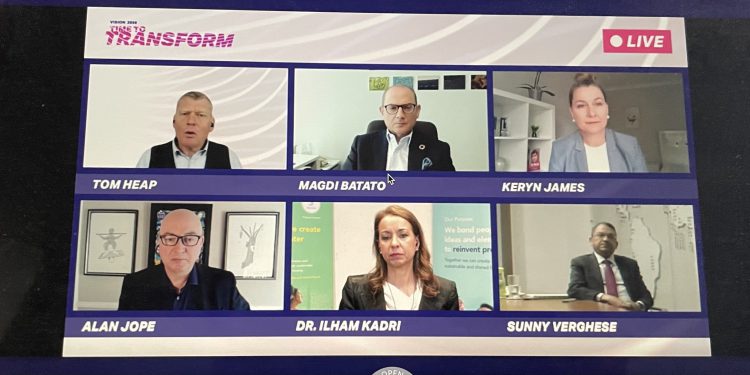Some of the world’s leading agrifood companies are behind a high-level call to re-invent capitalism and transform food systems.
Rabobank, Olam, Nestlé, Unilever, Syngenta, BASF, Bayer and Yara, joined Chanel, Toyota, Shell and others in launching Time to Transform, Vision 2050, with the World Business Council for Sustainable Development.
The collaboration began 10 years ago, and this week, it was revealed that efforts at transformation so far had largely failed. In the meantime, the need for change had only become more urgent.
In the report’s forward the signatories say, “We need to re-invent capitalism that we have grown up with, so it rewards value creation, not value extraction. We must make our businesses more resilient and adaptable to the disruptions that inevitably lie ahead. And we must think regeneratively, moving beyond a doing no harm mindset to one in which we enable our social, environmental and economic systems to heal and thrive.“
At the launch conference, Magdi Batato, Executive Vice President at Nestlé, said, “What’s good for you is good for the planet. Diets will need to shift to more climate friendly ones and more sustainable… we need to do dairy in a more sustainable way.
“Value chains are about people and it all starts with the farmer. Value chains need to be good and prosperous to be sustainable. Farmers need to have good margins. If you have a good margin for the farmer it attracts the next generation.
“We must inspire our employees, investors, suppliers because they are part of the journey”
“Farmers are getting old in many parts of the world and we need their sons, grandsons and granddaughters to continue. Part of that equation is empowering women and youth.
“Consumer appeal is shifting toward circular models of consumption. That supports value creation rather than value extraction. That will be the basis of re-inventing capitalism. A capitalism that is more inclusive, more holistic, more integrated.
“It’s key to have governments on board, many companies on board, entire supply chains on board. We must inspire our employees, investors, suppliers because they are part of the journey.”
Alan Jope, CEO at Unilever, said, “Of course we have our net zero targets in place, any company that doesn’t we need to be asking why. We need to publish the carbon footprint of our business and the carbon footprint of our products so people can make more informed brand choices.
“There’s soon going to be more plastic than fish in the oceans. So we all need to be cutting down our use of virgin plastic, collecting up and recycling more than we sell.
“We’re going to require than everyone makes at least a living wage which is well above a minimum wage across our supply chains. The business case is crystal clear the urgency is extraordinary and there are very tangible steps that business large and small can and must take.
“The report mentions three over-arching challenges, climate change, nature and inequality and all three need to be tackled in concert.
“We’ve had a gender inequality problem for ages, there’s an income inequality problem, we’ve seen the outrage over the last 12 months over racial inequality and business has a strong role to play in tackling all three of those types of inequalities and others.”
“Science-based targets for reducing agrifood must be set and agriculture turned into a carbon sink”
A key area needing change, according to report, is finance. It says credit ratings agencies must improve analysis of Environmental, Social and Governance (ESG) risk exposure across climate change, human rights, nature loss and water scarcity.
It calls for transparency so beneficiaries, pension holders and other retail investors, can see the sustainability-impact of investments.
Companies need to include ESG-related risks and opportunities plus natural, social and human capital impacts and dependencies into accounting processes and valuation assumptions.
And the retail and investment banks must embed sustainability throughout their business models. They need to develop sustainable finance instruments, ensuring their own loans and investments are sustainable, and develop robust analysis of ESG factors on the sell side.
Regarding food systems, the report says businesses must account for the true value of food by factoring in natural, social and human capital costs and require re-invent capitalism for environment.
Transparency and traceability mechanisms must be developed throughout the food value chain.
Redesigned food product portfolios must be developed to reduce environmental externalities and provide healthier options. In particular, companies must drive research and development around protein substitution with a focus on disruptive technologies and re-imagined animal feed sources.
Deforestation and land conversion-free food supply chains have to be developed, while also investing in restoration.
Science-based targets for reducing agri-food must be set to hold temperature rises to 1.5°C and agriculture must be turned into a carbon sink.
Human rights due diligence must factor across supply chains. And value must be shared equitably throughout the value chain, with farmers and fisher people receiving their fair share need to re-invent capitalism because of climate change.























